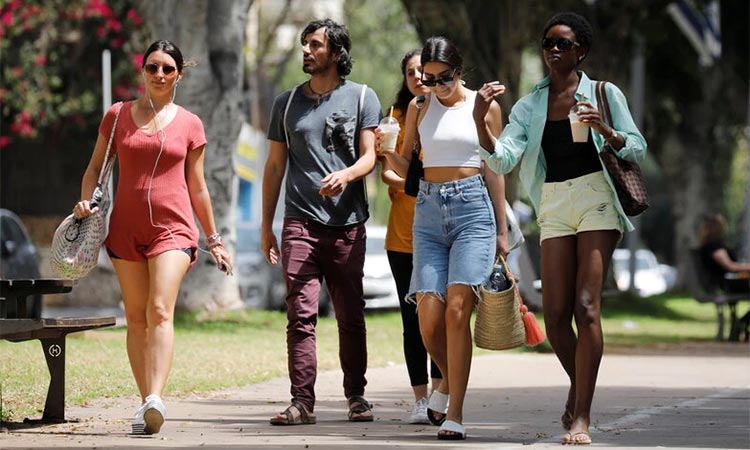The odd joy of sending kids back to school

Students wearing protective face masks attend a music class at Takanedai Daisan elementary school in Funabashi, Tokyo. Reuters
Robin Abcarian, Tribune New Service
The 11-year-old returned to the classroom last Thursday. The actual, physical IRL classroom on the second floor of her Venice elementary school. Inside, she and eight other fifth graders sat at well-spaced desks, many looking as if they’d died and gone to heaven.
Or perhaps I was projecting.
Surely, this was one of the strangest and most exhilarating back-to-school days of all time.
Our emotions were all over the place. As we drove toward school, a big yellow bus passed us, and to my surprise, I choked up. It had been so long since I’d seen one. On Wednesday night, our good-humoured, tireless principal sent a detailed email, complete with photographs, about what to expect in the morning, where to line up, how to get in.
“Please read at your own risk,” he wrote. “A glass of wine in hand will be most helpful.” Maybe two.
In the “before times,” we worried about making sure the kids had their homework with them before walking out the door. Now, Los Angeles Unified families must go online every school day and complete a health questionnaire (“not more than a two-minute process!” we are promised). The district’s website then generates a “daily pass” with a QR code, to be scanned by a designated “welcomer” outside the schoolhouse doors.
And so it went Thursday: QR codes presented, temperatures taken, families hugging goodbye, kids disappearing into school, their grown-ups drifting away.
So normal, and yet so strange. The school day lasts only three hours. Classrooms are only half full. And everyone is masked. I don’t know about you, but masks have become so ingrained in daily life that I’m starting not to notice them anymore. Sometimes when I walk outside without one, I feel naked.
Here’s what else wasn’t quite normal at school: At recess, children lined up and a nurse handed them a long cotton swab to roll around in each nostril for 15 seconds. Once a week, children will be tested for COVID-19 at school.
They aren’t supposed to touch each other when they play, though I have it on good authority that a game of touch tag was played Thursday.
“No one stopped us,” said my cheerful informant.
This has been among the most difficult school years in history, and some children (never mind their exhausted parents) may not ever fully recover from it. It may be a long time before we truly understand the fallout. I know that our household is one of the lucky ones; my niece flourished at home, in no small part because I let her have the office to herself and relegated myself to the kitchen. She’s far more adept at the computer now and has made excellent academic progress.
As my colleague Howard Blume has reported, they object to the shorter, three-hour in-person school day, implying that teachers are doing less work. I, too, wish the school day were longer. But less than half of elementary school children are expected to return to in-person learning this school year. Those who stay home will continue to have Zoom school. At our school, that means teachers will spend half the day in the classroom and half online. This does not sound like a cushy workday.
I used to think that Beutner, who spent one rocky year as publisher of the Los Angeles Times, was one of those arrogant investment banker types who, having made a bazillion dollars, figured he could run anything. I expected him to fall on his face as superintendent.
But I have nothing but respect for the way he has stepped up in the last year to make sure that families were fed, and that children received proper equipment for at-home schooling.
Last fall, when Zoom school resumed, we established a classroom pod with another family, switching off houses a few days a week. It was an attempt to combat our kids’ social isolation. But we soon learned that leaving two tween girls alone together was not a great formula for focusing on schoolwork. The learning pod dissolved and became an after-school and weekend socializing pod.
Now the 11-year-old is back in school, and the house is incredibly quiet. No one is bounding downstairs every hour announcing, “I’m starving!”
Sounds crazy, but there are already things I miss — my niece’s squeals of delight, the sound of chattering kids, the soothing voice of the teacher reading aloud. On balance, however, these are things I can live without.







